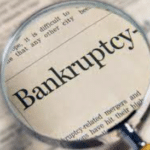California Homestead Exemption New Assembly Bill 1885 expands California’s homestead exemption enhancing the benefits of filing a chapter 7 and chapter 13 bankruptcy. This new legislation went into effect January 1, 2021. The idea behind the new bankruptcy California homestead exemption law is to help limit liabilities while protecting homeowners from losing their homes in
Bankruptcy
What Happened to Silicon Valley Bank?
Silicon Valley Bank On Friday, March 10, 2023, Silicon Valley Bank collapsed. Silicon Valley Bank (SVB) was the 16th largest bank in the United States, and its collapse was the second largest bank collapse in United States history. How Did SVB End Up Here?Over the span of just a couple of days, thousands of SVB’s
The Value of the Right Bankruptcy Attorney
Finding the Right Bankruptcy Attorney Bankruptcy can be a scary word. However, with the right bankruptcy attorney, it may spell relief. Filing for bankruptcy may provide a solution to debt problems and give you a fresh start. All bankruptcy proceedings are governed by the Bankruptcy Code, which classifies bankruptcy matters in different chapters depending on
Will I lose My Retirement Account to Creditors in Bankruptcy?
Will I Lose My Retirement Account to Creditors in Bankruptcy? For those considering bankruptcy as a debt relief strategy, a main concern is whether they will lose their retirement account to creditors as part of the process. The short answer is, “it depends.” In many situations, keeping retirement savings is possible, but this is not
Filing Bankruptcy While Unemployed
Filing Bankruptcy While Unemployed The last few years have been economically challenging to say the least. Jobs were lost, stimulus payments have stopped, and savings have dwindled leaving many individuals to rely on credit cards to make ends meet. After a period of unemployment, many come to realize that a bankruptcy may be needed to
File Bankruptcy to Stop a Wage Garnishment
Wage Garnishment Formally known as an Earnings Withholding Order, or EWO for short, a wage garnishment can seriously affect a debtor’s ability to maintain a minimal standard of living sufficient to pay for necessities like food and housing. That is because a wage garnishment typically takes a 25% chunk out of a debtor’s paycheck. Fortunately,
Does Bankruptcy Clear Tax Debt in California
Does Bankruptcy Clear Tax Debt Individuals and businesses facing financial peril want to know, does bankruptcy clear tax debt in California? Those considering bankruptcy are typically dealing with severe financial stress which resulted from distinct types of debt and financial burdens. Will filing for bankruptcy put you back on the right financial track? Is Bankruptcy
How to Get Rid of Tax Debt Without Filing for Bankruptcy
Get Rid of Tax Debt A common question asked by those who fall behind on taxes is, “How to get rid of tax debt without filing for bankruptcy?” Our legal professionals at RJS LAW help answer this question often and this blog post will discuss some of the different programs and approaches used to help
How Common Is Bankruptcy?
Is Bankruptcy Common How common is bankruptcy? Bankruptcy filings are more common than you might think. A recent study looked at thousands of filings over a 6-year period and found some interesting bankruptcy filing patterns. Here is what the research found. How Many People Have Filed for Bankruptcy? From 2013 until 2019 approximately 1 in
Bankruptcy and Student Loans
Are Student Loans Dischargeable in Bankruptcy? For many years conventional wisdom has been that student loans are not eligible for discharge in bankruptcy filings. However, as we learn more about bankruptcy and student loans, we have found recent court rulings which may be opening the door for some borrowers to wipe out their student loan










